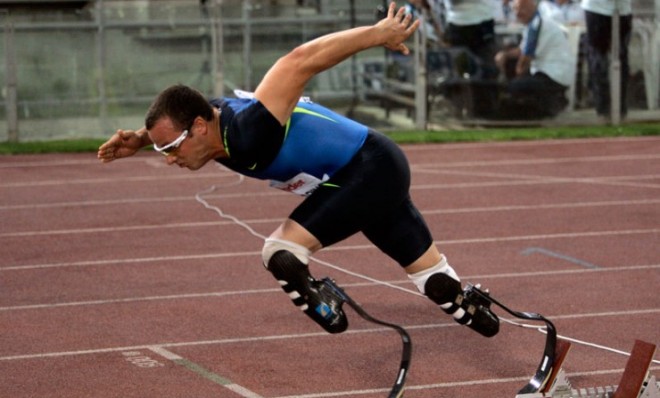Did South African police blow their case against Oscar Pistorius?
For starters, the lead detective on the Blade Runner's murder case is also accused of attempted murder


South African model Reeva Steenkamp is dead, and nobody disputes that double-amputee track star Oscar Pistorius fatally shot her while she was in the toilet stall of Pistorius' Pretoria-area house. But other than that, the case just keeps getting weirder.
At what was supposed to be a routine bail hearing Thursday, prosecutors acknowledged that their main witness, lead investigator Detective Hilton Botha, was due in court in May to face seven criminal counts of attempted murder. And under tough cross-examination from Pistorius' lawyer, Barry Roux, Botha conceded on Wednesday that there may not be enough evidence to support the prosecution's case that Pistorius murdered Steenkamp in cold blood after a fight early on Feb. 14. Pistorius says he believed he was shooting at an intruder.
The case was already tabloid-friendly enough when police Brig. Neville Malila dropped the news, "as bewildering as it was sensational," that Botha faced attempted murder charges, say Lydia Polgreen and Alan Cowell in The New York Times. In the October 2011 incident, Botha and two other police officers allegedly shot up a minivan taxi carrying seven passengers, possibly while drunk, Malila said Thursday. The case had been provisionally shelved, and "we were informed yesterday that the charges will be reinstated." The decision to reactivate the police-shooting case, apparently made Feb. 4, won't help the prosecution's case against Pistorius, Malila acknowledged, but "at this stage, there are no plans to take him off the Pistorius case." (That might change later Thursday, when the police hold a press conference.) Prosecutor Gerrie Nel told the court on Thursday that his team also had no idea about the pending charges when they had Botha take the stand Wednesday.
The Week
Escape your echo chamber. Get the facts behind the news, plus analysis from multiple perspectives.

Sign up for The Week's Free Newsletters
From our morning news briefing to a weekly Good News Newsletter, get the best of The Week delivered directly to your inbox.
From our morning news briefing to a weekly Good News Newsletter, get the best of The Week delivered directly to your inbox.
Here's the prosecution's basic case: A witness (or witnesses) heard shouting in Pistorius' house in the early hours of Feb. 14, then, around 3 a.m., one gunshot followed 17 minutes later by more shots. Pistorius walked into his bathroom on his prosthetic legs, Botha testified, then shot Steenkamp through the door, hitting her in the hip, arm, and head. On Tuesday, the presiding judge increased the charge to premeditated murder, saying he couldn't rule out that the runner had planned the killing in advance.
Here's Pistorius' basic case, laid out in an affidavit: Steenkamp probably got up to go to the bathroom while Pistorius was closing the balcony door; hearing noises, he grabbed his gun, shouted for what he believed to be intruders to leave, then shot at them through the toilet stall door. He was not wearing his prosthetic legs, leaving him feeling especially vulnerable. Steenkamp locked herself in the stall when she heard Pistorius shouting about intruders, Roux suggested on Wednesday, and her empty bladder at the time of death backs up Pistorius' assertion that she was in the bathroom to use the toilet, not to hide from him.
Things started going south for the prosecution during Roux's "withering cross-examination that left Detective Botha grasping for answers that did not contradict his earlier testimony," say Polgreen and Cowell in The New York Times. Botha was "forced to concede that he could not rule out Mr. Pistorius's own version of events based on the existing evidence," copping to sloppy police work, inconclusive or preliminary evidence, and some conjecture. In fact, says Andrew Harding at BBC News, "some might argue that Det. Botha, who wilted under strenuous cross-examination by the defense... has already done enough damage to the prosecution's call for Mr. Pistorius to be denied bail and that the new revelations may not affect the magistrate's decision significantly."
The prosecutorial bungling is already drawing unfavorable comparisons to another infamous murder trial.
A free daily email with the biggest news stories of the day – and the best features from TheWeek.com
So perhaps it makes sense that one of Simpson's legal advisers, Alan Dershowitz, thinks Pistorius may not be guilty of murder. "The thing that gives me some level of confidence that he may well be innocent," Dershowitz tells CNN, is that "his lawyer did something that no reasonable lawyer would ever do unless he was absolutely certain of his client's innocence — put his story in an affidavit.... Because if there's anything in that affidavit that is contradicted by one single bit of forensic evidence, the case is over."
And this is just the bail hearings. Whatever happens with Botha, it's a good bet the Pistorius trial will be South Africa's trial of the century.
Sources: The Associated Press (2), BBC News, CNN, The Guardian, Independent, The New York Times
Peter has worked as a news and culture writer and editor at The Week since the site's launch in 2008. He covers politics, world affairs, religion and cultural currents. His journalism career began as a copy editor at a financial newswire and has included editorial positions at The New York Times Magazine, Facts on File, and Oregon State University.
-
 Dive right into these 8 underwater adventures
Dive right into these 8 underwater adventuresThe Week Recommends It’s time to make a splash
-
 The world’s oldest rock art reveals hints about human migration
The world’s oldest rock art reveals hints about human migrationUnder the Radar The art is believed to be over 67,000 years old
-
 Grok in the crosshairs as EU launches deepfake porn probe
Grok in the crosshairs as EU launches deepfake porn probeIN THE SPOTLIGHT The European Union has officially begun investigating Elon Musk’s proprietary AI, as regulators zero in on Grok’s porn problem and its impact continent-wide
